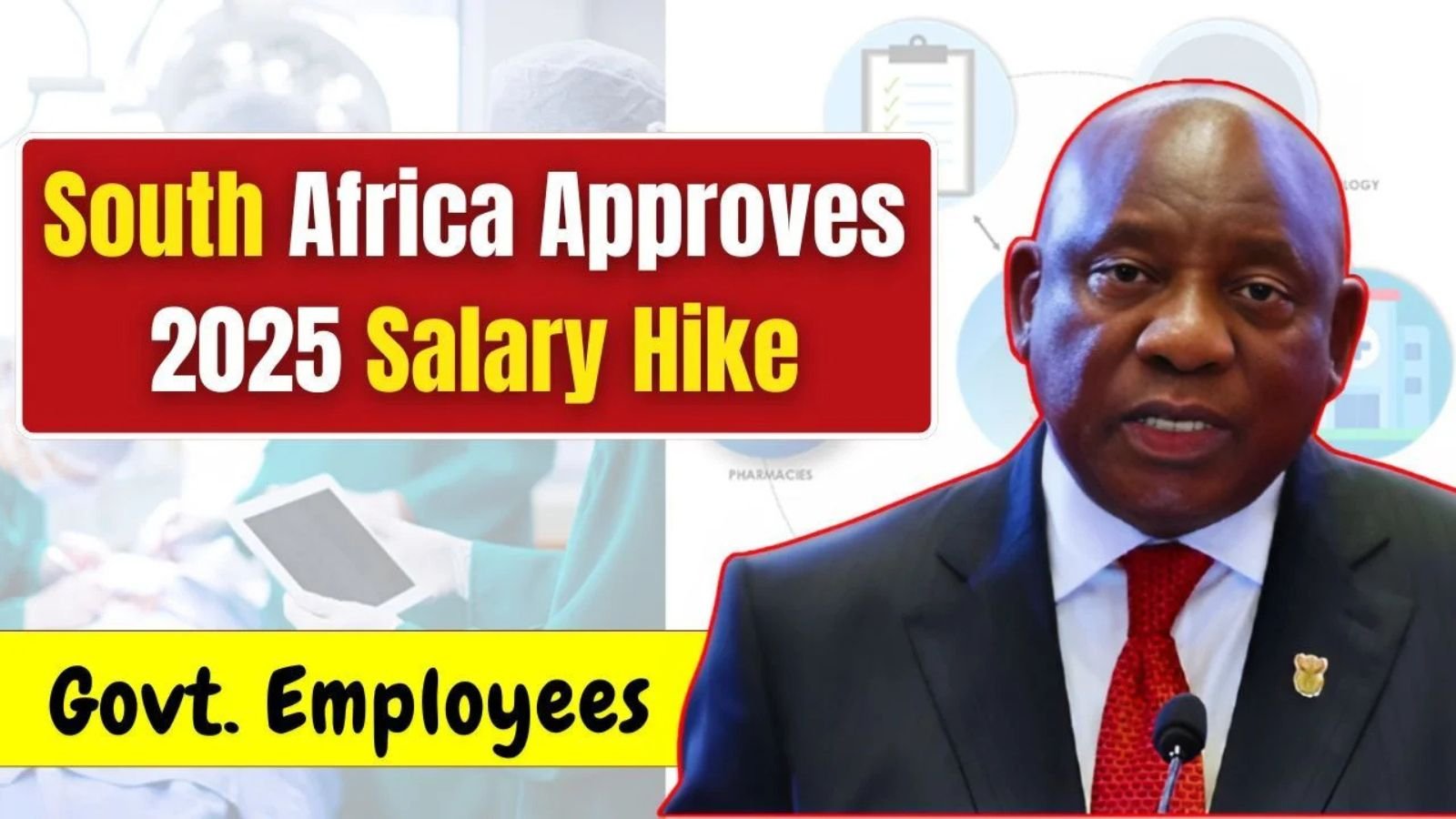In a move welcomed by millions of South Africans, the government has officially confirmed a June 2025 salary hike for public sector workers. This announcement follows prolonged negotiations between organized labor unions and the Department of Public Service and Administration (DPSA), culminating in a 6.5% salary increase for all qualifying government employees. For many, this wage adjustment could not have come at a more critical time. With the cost of living steadily climbing—fueled by rising utility costs, fuel prices, and food inflation—public servants have long been advocating for a raise that reflects their vital contribution to national service delivery.
This article explores the comprehensive details of the June 2025 salary hike, the reactions from various stakeholders, the potential impact on the economy, and what this development means for the future of South Africa’s public service sector.
Understanding the June 2025 Salary Hike
The June 2025 salary hike represents a 6.5% across-the-board salary increase for public sector workers in South Africa. From July 2025 onwards, employees in national and provincial departments—including nurses, teachers, police officers, and civil servants—will see an uplift in their monthly earnings. The agreement was formalized through the Public Service Coordinating Bargaining Council (PSCBC), which serves as the primary platform for negotiating labor matters in the public sector.
This adjustment was hard-fought. Unions initially demanded an increase above 8% to match the real rate of inflation and ensure a meaningful improvement in take-home pay. However, fiscal constraints and economic realities prompted a compromise. The final agreement, while lower than originally requested, marks a step forward in restoring the purchasing power of public servants whose real wages have stagnated over the past several years.
Why the June 2025 Salary Hike Is a Big Deal
There are several reasons why the June 2025 salary hike holds significant importance:
- Combatting Inflation and High Living Costs
Inflation in South Africa has placed enormous pressure on household budgets. From rising electricity tariffs to skyrocketing grocery prices, many public sector workers have struggled to keep up. This wage increase helps soften the blow by increasing disposable income for workers across the country. - Boosting Morale and Productivity
The morale among frontline public servants had been waning due to years of wage freezes and minimal adjustments. The salary hike sends a clear signal of appreciation and recognition, which can positively affect productivity, retention, and service delivery outcomes. - Maintaining Labor Stability
Labor unions had threatened industrial action earlier in 2025 if wage demands weren’t met. The government’s approval of the June 2025 salary hike has significantly reduced the risk of strikes or disruptions, ensuring that schools, hospitals, and administrative offices can continue operating without interruption.
What’s Included in the Hike?
Aside from the 6.5% increase in basic salary, several key benefits remain unchanged:
- Housing Allowance: Employees will continue to receive support to help with rent or mortgage payments.
- Medical Aid Contributions: Government co-contributions to medical insurance schemes remain intact.
- Pension Contributions: Public servants can still rely on employer contributions toward their retirement savings.
While the unions pushed for improvements to these additional benefits, maintaining them without reductions was seen as a victory given the tight fiscal environment.
The Government’s Viewpoint: A Delicate Balancing Act
Implementing the June 2025 salary hike places considerable pressure on the national budget. Treasury officials have already indicated that public sector wages account for a substantial portion of government expenditure. With national debt climbing and economic growth still below pre-pandemic levels, making room for a salary increase required careful budget reallocation.
To fund the increase, the government has focused on reprioritizing expenditure, curbing wasteful spending, and exploring alternative revenue sources such as improved tax collection efficiency. Finance Minister Enoch Godongwana emphasized that the increase, though costly, was a “necessary investment in the people who keep our nation running.”
Importantly, the salary hike has been incorporated into the 2025/2026 fiscal year budget, meaning there will be no additional borrowing required to fund it—at least for now.
Reactions from Labor Unions and Workers
The response from labor unions has been largely positive, albeit with mixed emotions. Union leaders have acknowledged that while the increase does not fully meet their expectations, it is still a meaningful step in the right direction.
Public Servants Association (PSA) and NEHAWU—two of the largest unions representing government employees—lauded the transparent and non-confrontational negotiation process. They also emphasized the importance of resuming talks in early 2026 to reassess salaries in light of inflation trends and cost-of-living metrics.
Public servants themselves are cautiously optimistic. For many, especially those on lower salary bands, the increase offers some relief from financial stress. A primary school teacher in Mpumalanga remarked, “We are not celebrating yet, but this gives us some breathing room. At least we know we’re being heard.”
Broader Economic Implications
South Africa’s public sector employs nearly 1.3 million people, making any salary adjustment a macroeconomic event. Economists are closely watching the ripple effects of the June 2025 salary hike across several fronts:
- Increased Household Spending
With more money in their pockets, public sector employees are expected to boost local economies through increased spending—especially in retail, services, and housing sectors. - Inflation Concerns
Some analysts warn that higher wages could stoke inflation, particularly if businesses respond to increased demand by raising prices. However, others argue that the risk is minimal given South Africa’s current economic conditions. - Impact on Private Sector Wage Demands
The salary increase may influence wage negotiations in the private sector, especially in industries like banking, education, and healthcare where public-private compensation comparisons are often made. - Sustainability Risks
Without parallel growth in tax revenues or GDP, repeated salary hikes could jeopardize long-term fiscal sustainability. Economists urge the government to link future increases to productivity gains and broader public sector reform.
Implementation: What to Expect Next
With the agreement finalized, attention now turns to execution. The DPSA, in coordination with the National Treasury and provincial departments, is set to implement the salary adjustment beginning in July 2025. Payroll systems are being updated to reflect the new salary scales.
Public sector employees are advised to check their payslips carefully from July onward to ensure the correct adjustments have been made. Any discrepancies should be reported immediately to departmental HR offices.
Labor unions have committed to closely monitoring the implementation and are setting up feedback mechanisms to ensure that the rollout proceeds without technical glitches or undue delays.
Looking Ahead: Will There Be More Increases?
The June 2025 salary hike may not be the last. Both government and union representatives have agreed to revisit salary discussions in early 2026, taking into account inflationary trends and budget performance. There is also growing momentum to explore performance-based increases, which could offer more substantial rewards for departments that meet service delivery targets.
In addition, the National Treasury is exploring the idea of developing a multi-year wage agreement to improve planning, avoid annual conflict, and foster greater collaboration between government and labor representatives.
Final Thoughts: A Much-Needed Boost Amid Challenging Times
The June 2025 salary hike is more than just a number on a paycheck—it is a recognition of the sacrifices and hard work of South Africa’s public servants. It acknowledges the vital roles played by educators, healthcare workers, law enforcement personnel, and administrative staff in sustaining the machinery of the state.
While the 6.5% increase may not completely solve the financial challenges faced by these workers, it is a significant step in restoring dignity, strengthening morale, and fostering labor peace. Equally important, it reflects a maturing relationship between government and labor unions—one built on dialogue, compromise, and mutual respect.
As South Africa navigates the uncertain waters of post-pandemic recovery, global inflation, and domestic reform, ensuring the well-being of its public servants will remain a cornerstone of national resilience.
FAQs: June 2025 Salary Hike
Q1: Who qualifies for the June 2025 salary hike?
All eligible public sector employees at both the national and provincial levels will receive the 6.5% increase.
Q2: When will the salary increase take effect?
The salary hike takes effect in June 2025, with adjusted payments appearing in July 2025 paychecks.
Q3: Will additional benefits change with this increase?
No. Existing benefits such as housing allowance, medical aid contributions, and pensions remain unchanged.
Q4: Are there future increases planned?
The government has committed to further negotiations in early 2026 to assess the possibility of additional increases.
Q5: How will this affect the economy?
The hike could boost short-term spending but may place added pressure on the national budget if not matched with economic growth.
Some Important Link
| Telegram Group | Click Here |
| WhatsApp Group | Click Here |
| Home Page | Click Here |










